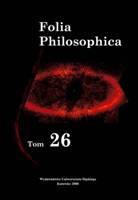Aksjologiczne presupozycje marksizmu i psychoanalizy
Axiological presuppositions of Marxism and psychoanalysis
Author(s): Mikołaj DomaradzkiSubject(s): Philosophy
Published by: Wydawnictwo Uniwersytetu Śląskiego
Keywords: psychoanalysis; axiology; critique; Marxism; tradition
Summary/Abstract: The aim of the article is to confront normative pre-assumptions of Marx’s and Freud’s emancipatory projects. Considerations on axiological presuppositions of the projects under discussion come to the conclusion that an argument between psychoanalysis and Marxism has its source in the two mutually exclusive systems of values whereas the psychoanalytical critique of Marxism remains the legacy of a conflict dating back to the beginnings of the Enlightenment. The article claims that a confrontation of Freud’s emancipatory project with that of Marx’s means a confrontation of two traditions: according to the first one — pessimistic and referring to Hobbes — man is bad by nature, whereas the other — optimistic and deriving from Locke — man is good by nature. The final conclusion, thus, is a statement that though both Marx and Freud were certain that their emancipatory projects were devoid of not only metaphysical presuppositions, but also metaphysical conclusions, a Freudian critique of Marxism refers to an axiological argument between Locke and Hobbes. Because both in psychoanalysis and Marxism a descriptive order is intricately intertwined with a normative one. The conflict between the two emancipatory projects must remain ilsolluble owing to the antagonistic axiological presuppositions.
Journal: Folia Philosophica
- Issue Year: 2008
- Issue No: 26
- Page Range: 185-301
- Page Count: 17
- Language: Polish

